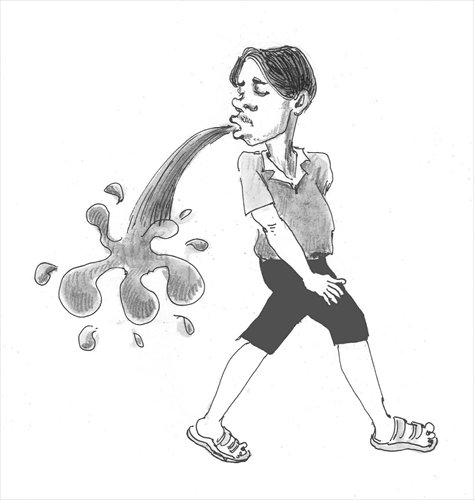The spitting image of China

Illustration: Luo Xuan/GT
When I was in high school my English teacher entered me in an Eisteddfod to recite a poem by Jenny Joseph. In it, she lists a number of things she will start doing when she's old, ending the first verse of "Warning," with the line: "And I will learn to spit."
It implies that spitting, along with spending one's pension money on brandy and swearing in the street, are generally considered inappropriate behavior, that somehow become a little more excusable when one is aged. But it didn't take a poem to teach me that spitting in public is unacceptable social behavior.
Growing up in Africa where diseases such as tuberculosis are prevalent in densely populated areas, we were taught from a young age that contagious diseases are spread not only through human contact, but through body fluids, including sputum. Posters in schools and other public places, made this very clear.
I don't recall my peers having to be admonished for spitting on sidewalks, plants, bathroom basins or the subway. But I imagine their mothers would have given them a very stern talking to, the same as they would get if they picked their noses.
So if not for social reasons, it beggars belief that China still tolerates people literally spitting in their path when this region has frequent concerns about viral health outbreaks like SARS and MERS. If China ever fell victim to Ebola, it would be in serious trouble if people were allowed to continue spitting everywhere.
I usually scoff at Chinese tourists in Africa who walk around in our clean, fresh air along a seaside promenade that nobody dares ever spit on, or in airplanes and airports, with masks on their faces, ostensibly concerned about airborne diseases.
Yet, in Beijing, nobody seems to balk at using a basin in a public bathroom that a woman has repeatedly spat in, or stepping into a pool of freshly laid gob on a sidewalk or in a park. Surely therein lies potential health risks too? You take that spit home on the sole of your shoe. What if a toddler bends down to rub his or her little hands in it, and then licks it?
Beijing attempted to outlaw spitting during the 2008 Olympics because it didn't want to upset visitors.
As far back as 2006, China was reported to be spending millions introducing surveillance and fines for offenders, so why is it still happening so frequently?
A local told me that spitting in Beijing is less frequent now than it was 20 years ago. He blamed rural Chinese who migrated to the city for bringing the bad habit with them.
Still, it seems no place is sacred from spitting. My hackles rise each time I hear someone clear their throat, the hairs on the back of my neck stand up, and I'm on high alert looking left and right to determine from which direction it will come.
I'm particularly fearful while out running because if that person is running too, the spit will fly with added velocity and could land on my shoes.
It's a real pity that travel websites will warn visitors of the spitting first, before even mentioning the hazardous air.
This article was published on the Global Times Metropolitan section Two Cents page, a space for reader submissions, including opinion, humor and satire. The ideas expressed are those of the author alone, and do not represent the position of the Global Times.